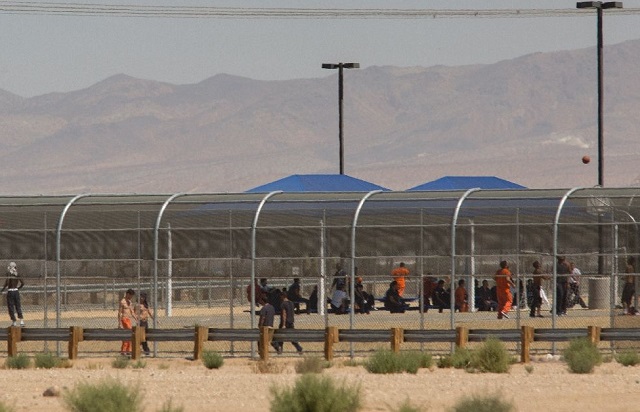
Washington, United States | AFP |
Donald Trump’s White House triumph this month caught the business world by surprise but also breathed life into a little-understood US industry: private prisons and migrant detention centers.
Following the Republican’s election, shares in two of the sector’s major players, CoreCivic (formerly known as Corrections Corporation of America) and the GEO Group have skyrocketed 43 percent and 21 percent, respectively, after having languished in recent months.
In August, the US Justice Department left them reeling after announcing it would phase out the use of private prisons, even though there were only about a dozen privately run correctional facilities at the federal level.
During her presidential campaign, Democrat Hillary Clinton seemed set to continue this policy, saying in particular that “you have a profit motivation to fill prison cells with young Americans.”
Private prisons currently house just a fraction, or about 0.5 percent, of the total US inmate population of 2.2 million.
But Trump’s November 8 victory upended the outlook and investor sentiment as well. The billionaire clinched the White House with an aggressive law and order message, promising at one point to deport all 11 million of the country’s undocumented immigrants — a move that could swell the population of migrant detainees.
In the United States, migrant detention centers are overwhelmingly managed by private companies, CoreCivic and the GEO Group in particular, under the oversight of US Immigration and Customs Enforcement.
As a result, Trump’s vow to deport or incarcerate two to three million undocumented immigrants right after taking office in January could be a boon to the sector.
“It will lead to a huge increase in the number of immigrant detentions,” said Bethany Carson of the GrassRoots Leadership, an activist group that opposes mass incarceration.
She said immigrants targeted for deportation would have to be detained “because there’s no way to just deport people who have been living in this country without going through some kind of legal proceedings.”
Various estimates say about 400,000 migrants are currently detained every year in the United States — a taxpayer expense but a revenue stream for private industry. One adult bed in a detention facility runs to $123 dollars a day while family units cost $342, according to official numbers.
According to the market research firm IBISWorld, the business of holding people awaiting deportation accounts for 21 percent of the private detention industry, estimated at $5.3 billion in the United States.
Happy days for the industry
“This number is anticipated to grow in the next five years as major industry operators Corrections Corporation of America and the GEO Group expand the capacity for housing illegal immigrants,” IBISWorld said in a report published shortly before election day.
In comments to AFP, both companies avoided showing any exuberance but defended the services they render to the government.
“We look forward to continuing our longstanding partnership with the federal government in providing high quality and cost effective correctional, detainment and rehabilitative services,” GEO Group vice president Pablo Paez said in an email.
Whatever posture the incoming Trump administration ultimately adopts, the industry has happy days ahead.
Since 2009, Congress has required the federal government to keep at least 34,000 beds in detention centers filled to promote efforts to fight illegal immigration, a measure that has benefited the private detention industry.
Pointing to a lack of government oversight of conditions in migrant detention facilities, the American Civil Liberties Union recently called on ICE, the immigration enforcement agency, to “end its dependence” on the private sector.
Trump, however, has shown little sign of sharing this view.
“With prisons, I think we can do a lot of privatization and private prisons. It seems to work a lot better,” he said in March.
 The Independent Uganda: You get the Truth we Pay the Price
The Independent Uganda: You get the Truth we Pay the Price



